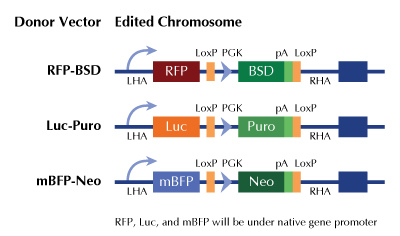Ctnnb1 Mouse Gene Knockout Kit (CRISPR)
CAT#: KN303967BN
Ctnnb1 - mouse gene knockout kit via CRISPR, HDR mediated
Functional Cassette: GFP-puro Luciferase-Puro RFP-BSD
HDR-mediated knockout kit validation
USD 1,657.00
4 Weeks*
Specifications
| Product Data | |
| Format | 2 gRNA vectors, 1 mBFP-Neo donor, 1 scramble control |
| Donor DNA | mBFP-Neo |
| Symbol | Ctnnb1 |
| Locus ID | 12387 |
| Components |
KN303967G1, Ctnnb1 gRNA vector 1 in pCas-Guide CRISPR vector KN303967G2, Ctnnb1 gRNA vector 2 in pCas-Guide CRISPR vector KN303967BND, donor DNA containing left and right homologous arms and mBFP-Neo functional cassette. GE100003, scramble sequence in pCas-Guide vector |
| Disclaimer | These products are manufactured and supplied by OriGene under license from ERS. The kit is designed based on the best knowledge of CRISPR technology. The system has been functionally validated for knocking-in the cassette downstream the native promoter. The efficiency of the knock-out varies due to the nature of the biology and the complexity of the experimental process. |
| Reference Data | |
| RefSeq | NM_001165902, NM_007614 |
| UniProt ID | Q02248 |
| Synonyms | Bfc; Catnb; Mesc |
| Summary | This gene encodes not only an important cytoplasmic component of the classical cadherin adhesion complex that forms the adherens junction in epithelia and mediates cell-cell adhesion in many other tissues but also a key signaling molecule in the canonical Wnt signaling pathway that controls cell growth and differentiation during both normal development and tumorigenesis. The gene product contains a central armadillo-repeat containing domain through which it binds the cytoplasmic tail of classical cadherins; meanwhile, it also binds alpha-catenin, which further links the cadherin complex to the actin cytoskeleton either directly or indirectly. Beta-catenin is therefore necessary for the adhesive function of classical cadherins. Another key function of this protein is to mediate the canonical Wnt signaling pathway and regulate gene transcription. Without Wnt signal, cytoplasmic beta-catenin that is not associated with the cadherin complex is quickly phosphorylated at the N-terminal Ser/Thr residues by the so called degradation complex containing axin, adenomatous polyposis coli (APC), casein kinase I, and GSK3B, then ubiquitylated by beta-TrCP, and degraded by the proteasome. However, in the presence of Wnt signal, the degradation complex is disrupted and the stabilized cytoplasmic beta-catenin translocates into the nucleus, where it binds various transcription factors and, together with these factors, regulates the transcription of many downstream genes. Mutations of this gene have been linked with various types of tumors. Alternatively spliced variants have been found for this gene. [provided by RefSeq, Sep 2009] |
Documents
| Product Manuals |
| FAQs |
| SDS |
Resources
Other Versions
| SKU | Description | Size | Price |
|---|---|---|---|
| KN303967 | Ctnnb1 - mouse gene knockout kit via CRISPR, HDR mediated |
USD 1,657.00 |
|
| KN303967LP | Ctnnb1 - mouse gene knockout kit via CRISPR, HDR mediated |
USD 1,657.00 |
|
| KN303967RB | Ctnnb1 - mouse gene knockout kit via CRISPR, HDR mediated |
USD 1,657.00 |
|
| KN503967 | Ctnnb1 - KN2.0, Mouse gene knockout kit via CRISPR, non-homology mediated. |
USD 1,657.00 |
|
| GA200548 | Ctnnb1 CRISPRa kit - CRISPR gene activation of mouse catenin (cadherin associated protein), beta 1 |
USD 1,657.00 |
{0} Product Review(s)
Be the first one to submit a review






























































































































































































































































 Germany
Germany
 Japan
Japan
 United Kingdom
United Kingdom
 China
China
